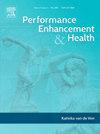业余健美运动员对兴奋剂和反兴奋剂的看法、动机和行为:系统综述
IF 3.7
Q2 HOSPITALITY, LEISURE, SPORT & TOURISM
引用次数: 0
摘要
本系统综述研究了业余健美运动员对兴奋剂和反兴奋剂的看法、动机和行为,重点关注心理、社会和动机因素。此外,该研究还确定了当前业余运动员反兴奋剂预防策略方面的研究缺口。方法在 SPORTDiscus、PubMed、Google Scholar、PsycArticles 和 Psyndex 中进行了全面检索。研究对象包括 14-70 岁的业余力量型运动员,明确排除了专业运动员和精英选手。结果类固醇的使用在业余健美运动员中非常普遍,其消费模式受年龄、性别和缺乏健康风险意识的影响。主要动机包括对身体形象的担忧、成绩压力和社会影响。网络社区和健身房文化对兴奋剂行为的形成起着至关重要的作用。 结论:专业运动员受益于完善的预防计划,而业余运动员则缺乏有针对性的反兴奋剂策略。目前迫切需要针对这一人群制定有针对性的教育和预防措施。未来的研究应优先考虑影响业余健美运动员使用兴奋剂的社会心理因素,以加强干预策略。本文章由计算机程序翻译,如有差异,请以英文原文为准。
Perspectives, motivations and behaviors of amateur bodybuilders regarding doping and anti-doping: A systematic review
Objectives
This systematic review examines the perspectives, motivations, and behaviors of amateur bodybuilders regarding doping and anti-doping, with a focus on psychological, social, and motivational factors. Additionally, it identifies current research gaps in anti-doping prevention strategies for amateur athletes.
Design
A systematic review was conducted following PRISMA guidelines, covering studies published from 2014 to 2024.
Methods
A comprehensive search was performed in SPORTDiscus, PubMed, Google Scholar, PsycArticles, and Psyndex. The review included amateur strength athletes aged 14–70 years, explicitly excluding professional athletes and elite competitors. Amateur bodybuilders were categorized as recreational or competitive, as their doping behaviors may differ.
Results
Steroid use is prevalent among amateur bodybuilders, with consumption patterns influenced by age, gender, and a lack of awareness about health risks. Key motivators include body image concerns, performance pressure, and social influence. Online communities and gym culture play a crucial role in shaping doping behavior.
Conclusion
While professional athletes benefit from well-developed prevention programs, amateur athletes lack targeted anti-doping strategies. There is an urgent need for tailored educational and prevention measures for this population. Future studies should prioritize psychosocial factors influencing doping in amateur bodybuilding to enhance intervention strategies.
求助全文
通过发布文献求助,成功后即可免费获取论文全文。
去求助
来源期刊

Performance enhancement and health
Social Sciences-Health (social science)
CiteScore
4.70
自引率
0.00%
发文量
27
审稿时长
57 days
 求助内容:
求助内容: 应助结果提醒方式:
应助结果提醒方式:


